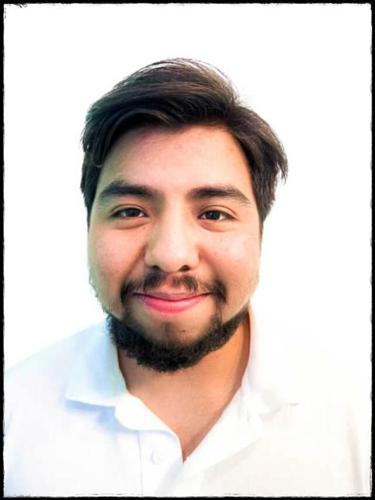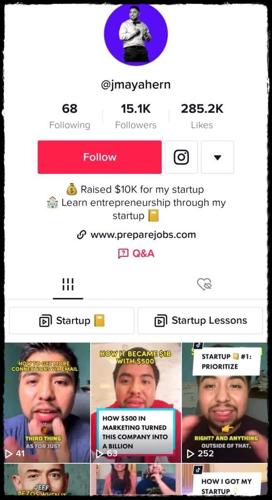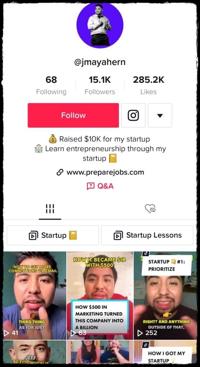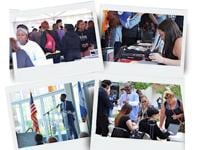
JUAN HERNANDEZ, 22, Los Angeles, Social Media Content Creator, He/Him, Mexican
Juan Hernandez is a 22-year-old student at University of California, Los Angeles. He hopes to graduate this year with a degree in Atmospheric and Oceanic Science.
Hernandez is also ready to join the ranks of Latinx entrepreneurs, taking the first steps to launch his first business called Prepare. Based in LA, it aims to fill a niche in college town communities.
His business provides undocumented students and undocumented immigrants with videos that explain how to make money as an undocumented immigrant, as well as how to apply for DACA for advanced status. In addition, the Prepare website allows users to ask each other anonymous questions and answers them as well.
Collectively, Los Angeles County was home to 631,218 minority-owned firms: 332,967 Latino; 213,203 Asian; 81,563 Black or African American; 11,081 American Indian and Alaska Native; and 3,798 Native Hawaiian and other Pacific Islander.
He creates social media content to share the lessons that he learned as an undocumented immigrant. Within three months of the pandemic, his Tiktok @mjayhern grew from zero to 15,000 followers. The videos that he creates include how to start a company, how to start independent contracting, and ways to get hired when you are undocumented.
As Hernandez strives to succeed as a small business owner, CALÓ NEWS spent a day with him to hear about his successes, challenges and the lessons he’s learned so far.
Responses have been edited for brevity and clarity.
WHAT MADE YOU WANT TO START YOUR JOURNEY AS AN UNDOCUMENTED ENTREPRENEUR?
For me it was a necessity; there wasn’t any other option and there was a limited amount of resources to help me. I also think it was inspiration, from other students. As I was taking headshots of entrepreneur students, I was able to hear out some of their ideas. One of the things that always came across was that they always wanted to build the next Facebook, the next Twitter, they want to build the next successful company.
I remember asking myself “Why can’t I be somebody like that” or “Why can’t I do something like that.”
I think that was the initial inspiration for me. I started educating myself and I started reading and listening to entrepreneur podcasts. My father was also an entrepreneur, he was doing day laboring. While I was working with him I would see how he would negotiate with his clients and make certain deals. I think the reason why I wanted to be an entrepreneur was a mixture of exposure and inspiration from others.
HOW HAS YOUR SOCIAL MEDIA CHANNELS IMPACTED OTHER UNDOCUMENTED PEOPLE WHO ARE SEARCHING FOR A JOB OR ARE TRYING TO START THEIR OWN BUSINESS?
I think it’s helped people be more open to the idea of entrepreneurship. I’ve had a few people reach out to me and trust me enough to tell me their stories. The number one thing that stops anyone from starting a company or asking for help is not knowing somebody in the field of entrepreneurship. Social media has allowed me to share my journey with people who are going through the same thing as me. It has also helped me be that trust factor to others who are also on the journey of entrepreneurship.
As of now, I’m more focused on developing a platform for other undocumented students. I want them to have an easier transition towards their career, whether it is connecting them with professionals or giving them the resources that they might need.

WHAT ARE SOME OF THE CHALLENGES YOU FACE AS AN UNDOCUMENTED DACA IMMIGRANT WHEN YOU’RE APPLYING FOR JOBS?
When I didn’t have DACA, there was no opportunity. The challenge before DACA was what companies can I trust, are they going to pay me and most importantly, can I disclose my status. With DACA there are more opportunities and I’m seeing them now. DACA is a fragile program that can be taken at any time. Part of the reason I want to be an entrepreneur is that I wouldn’t have to rely on work authorization to build a successful company. The other reason why I want to be an entrepreneur is so that I can help others in their journey as well.
WHAT WAS THE EMOTION YOU WERE FEELING WHEN YOU WERE UNDOCUMENTED? WHAT DID THAT MEAN TO YOU?
I was devastated when I found out I was undocumented. I remember being in high school and I had just landed an internship to teach day laborers English. They were asking me for certain types of documents that you need to have when you get an internship. I didn’t have any of those documents. I was so upset because I wasn’t able to capitalize on an opportunity like the other students that were in similar positions. I think from there, my mindset has always been like, “These are my circumstances now; how can I change the narrative.”
AS SOMEONE WHO WAS A DAY LABORER, HOW WAS THE TRANSITION FROM BEING A FREELANCE PHOTOGRAPHER TO A SOCIAL MEDIA CREATOR?
I’ve always been into creating social media content. I started creating content in high school for my YouTube channel and I had a few followers on that platform and I was doing it as a hobby. The transition from a day laborer to a freelance photographer is very different because as a freelancer I was doing something I enjoyed. I’m glad I was exposed to freelancing because that gave me the opportunity to create income. Being a day laborer was a lot of work and I didn’t enjoy it at all. Most of the time I was in the sun doing a lot of labor and manual work.
WHY IS IT IMPORTANT TO HELP OTHERS GROW THEIR KNOWLEDGE ON TOPICS THAT MANY PEOPLE WON’T TALK ABOUT LIKE IMMIGRATION STATUS?
I think it’s important for the economy and for the future. At UCLA, I took a class where I was learning about the future of immigration because of climate change, not just because of social economic factors. It was estimated, in one of my researches, [that] by 2051, a hundred million climate immigrants are going to move from other countries to the U.S. That’s just the future of immigration due to climate change. Now, combining the social economic factors, I really think immigration is the future. It’s important to start taking action because at some point the U.S is gonna have to start implementing programs to welcome immigrants. It’s also important to read about the history of immigration. Based on what I’ve read so far; it’s been really difficult.
WHAT IS A PIECE OF ADVICE YOU WISHED YOU HAD KNOWN EARLIER THAT COULD HAVE HELPED YOU EARLY ON AS A UNDOCUMENTED IMMIGRANT?
Be open-minded with the people you hang out with, and be open-minded to the different opportunities, whether they are paid or unpaid. Also, be open-minded about your future. Understand you might not be able to do certain things, but it is important to shift the narrative to the things you can do, like starting a business or doing independent contracting.
A lot of people don’t know, but even if you [only] have an individual taxpayer identification number, there are ways to get health care and ways to open up a bank account and set up a retirement account within your business. It’s also good to read research articles like the history of immigration and understand the facts. There are certain things that a lot of people fear, but if you look at some facts, there are some things that are not likely to happen. Some cities are sanctuary cities, meaning that authorities can’t just come out of nowhere. Being knowledgeable can help you out in the long run and give you that internal security.













(0) comments
Welcome to the discussion.
Log In
Keep it Clean. Please avoid obscene, vulgar, lewd, racist or sexually-oriented language.
PLEASE TURN OFF YOUR CAPS LOCK.
Don't Threaten. Threats of harming another person will not be tolerated.
Be Truthful. Don't knowingly lie about anyone or anything.
Be Nice. No racism, sexism or any sort of -ism that is degrading to another person.
Be Proactive. Use the 'Report' link on each comment to let us know of abusive posts.
Share with Us. We'd love to hear eyewitness accounts, the history behind an article.